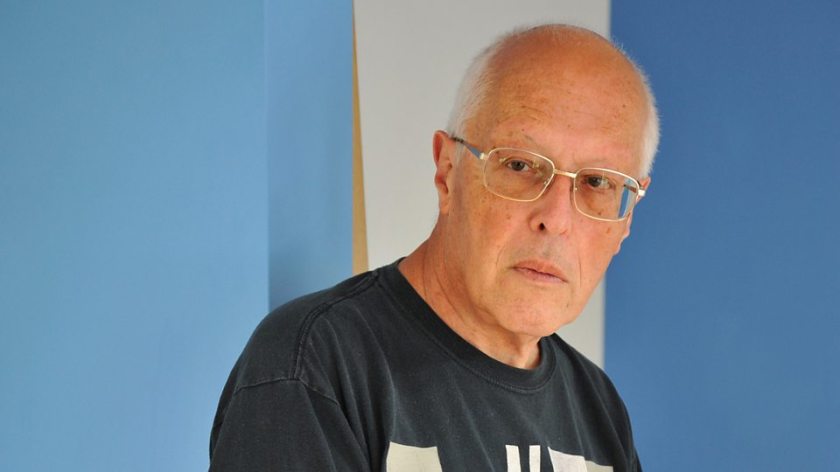Who or what were the most significant influences on your musical life and career as a composer?
In chronological order: (age 4) Polish folk-music from my Polish godfather; (age 11 – 12) Erik Satie and Charles Ives (via radio and Antony Hopkins ‘Talking about Music’); (teens) Varèse, Bartók, Schoenberg (from local libraries). I don’t come from a ‘musical family’, so all this is untrained, intuitive and serendipitous. I studied Art at school and particularly admired Hokusai, David Hockney and Robert Rauschenberg. My father was a photographer, working for the London County Council (later the GLC).
What have been the greatest challenges/frustrations of your career so far?
Ridding myself of the notion that it was possible to have a ‘CAREER’ as a composer. I just loved writing music, and wanted to do it as well as I could. Seriously and passionately. This then, is a vocation – or a hobby. Or maybe an obsession. I was lucky enough to be very well taught – by Bernard Stevens at the Royal College of Music. Until I was 45 I scraped by, coaching, playing the piano, and eventually finding places to teach.
What are the special challenges/pleasures of working on a commissioned piece?
It is always gratifying to think that someone WANTS you to write for them, or that one is USEFUL. Otherwise I don’t think ‘commissions’ make any difference to the way I work, except if they carry embargoes. I prefer to work for particular performers, people I know, whom I trust, and I think trust me.
What are the special challenges/pleasures of working with particular musicians, singers, ensembles or orchestras?
I usually write solos, or for small ensembles, or for amateur instrumentalists (choirs more often than instrumentalists). I have hardly ever worked with orchestras. I value dialogue. Music itself is intensely important to me, and I want to try and share it – intensely. Of course ‘intensity’ makes people nervous. Being ‘serious’ is also a bit risky. Being ‘gay’ still renders you part of a minority. I realised, pretty quickly, that I was an ‘outsider’, and so I learned to live with it. Isolation? I’m used to it.
Of which works are you most proud?
‘Proud?’ I am not proud of any of them, I know their faults. And if I find faults after the first performance I try to fix them up later. Try to! I am more pragmatic than idealistic. I suppose I am proud of my family and friends for putting up with me. But I was told ‘pride comes before a fall’.
How would you characterise your compositional language?
I wouldn’t! I don’t think about characterising anybody’s ‘composing’ as if it were a ‘language’… or as a ‘visual image’, even if poetry, novels, dramas, drawings, paintings, sculpture and architecture inform music, and can be used as analogies. In its ‘creative assembling and technical processes’ Music is close to Cinema. Music is also close to mathematics and physics, one must be sensitive to proportion and to the quality and measurement of time and space.
How do you work?
With pens, pencils, correction-fluid, scissors and paper – and my imagination, and a storehouse in my brain, looking out of the window, and in my personal library (books, scores, recordings). Also, these days, for copying purposes, with a printer and scanner. I work most readily and effectively in the early morning.
As a musician, what is your definition of success?
I try to achieve as clear a result as I can in my work, with all the many distractions that can potentially impair and contaminate it. If I succeed in that then I am (briefly) pleased, before all the doubts flood back in. I make mistakes. It is an essential part of learning – failing and learning from the failure. In the glare of the spotlight failure is not an option. Success, like money, is probably covertly corrupting.
What do you consider to be the most important ideas and concepts to impart to aspiring musicians?
Authenticity. Patience. Setting the bar as high as you can.
What do you feel needs to be done to grow classical music audiences/listeners?
I don’t know as an ‘expert’, and there are management courses that can certainly give you the ‘correct answer’. But just from common sense, and to continue the implications of ‘growing’ an audience horticulturally – prepare the ground with tender, loving care, don’t hurry the process. Don’t try to make a large profit if you have bought cheap. It’s a UK tradition, so difficult to countermand. Don’t compromise the quality of the music to put ‘bums on seats’. Respect the natural intelligence of the public. Don’t believe the generalisations and mythologies in the popular media, where they are prepared to use the word ‘élite’ about Sport, but not about Music. Make any event as ‘special’ and ‘significant’ as you can.
Michael Finnissy (born 17 March 1946) is an English composer and pianist.
Finnissy has taught at the Royal Academy of Music, the University of Sussex, and is Professor of composition at the University of Southampton and is Composer in Residence at St. John’s College Cambridge.

One comment